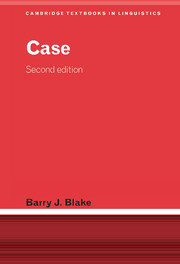Book contents
- Frontmatter
- Contents
- List of figures
- List of tables
- Preface to the Second Edition
- Preface to the First Edition
- List of abbreviations
- 1 Overview
- 2 Problems in describing case systems
- 3 Modern approaches to case
- 4 Distribution of case marking
- 5 Survey of case marking
- 6 Life cycle of case systems
- Notes
- Guide to terminology
- Guide to further reading
- References
- Author index
- Language index
- Subject index
- References
References
Published online by Cambridge University Press: 05 June 2012
- Frontmatter
- Contents
- List of figures
- List of tables
- Preface to the Second Edition
- Preface to the First Edition
- List of abbreviations
- 1 Overview
- 2 Problems in describing case systems
- 3 Modern approaches to case
- 4 Distribution of case marking
- 5 Survey of case marking
- 6 Life cycle of case systems
- Notes
- Guide to terminology
- Guide to further reading
- References
- Author index
- Language index
- Subject index
- References
- Type
- Chapter
- Information
- Case , pp. 208 - 218Publisher: Cambridge University PressPrint publication year: 2001

